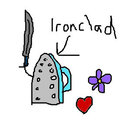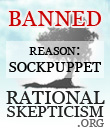They Found A Universal Word?
Huh?
Moderators: kiore, Blip, The_Metatron
•
26 posts
• Page 2 of 2 • 1, 2
Re: They Found A Universal Word?
Yeh, I think you inadvertantly found the other universal word, the English language's gift to the world - "shit".
For Van Youngman - see you amongst the stardust, old buddy
"If there was no such thing as science, you'd be right " - Sean Lock
"God ....an inventive destroyer" - Broks
"If there was no such thing as science, you'd be right " - Sean Lock
"God ....an inventive destroyer" - Broks
-

Ironclad - RS Donator
- Name: Nudge-Nudge
- Posts: 23973
- Age: 55

- Country: Wink-Wink

Re: They Found A Universal Word?
I bet you it's something different in the Basque language... 

We are alive, so the universe must be said to be alive. We are its consciousness as well as our own. We rise out of the cosmos and see its mesh of patterns, and it strikes us as beautiful. And that feeling is the most important thing in all the universe.
-

Nostalgia - Posts: 9266
- Age: 38

- Country: Earth

Re: They Found A Universal Word?
I too was not that convinced by this study.
In addition to the limited set of languages compared, they skated over any discussion about repair functions in different languages. In English words like 'Huh' and 'eh' are (in the language of conversation analysis) deployed as general trouble source indicators. Whether the trouble source is lexical, grammatical, pronunciation linked, misheard or unheard is not specified by the use of 'huh'; specific repair strategy phrases perform these roles. ( "You went where?", "Sorry, could you speak up? I didn't catch that," "What does etic mean?")
Is 'huh' a generalized trouble source indicator in all languages, or is it limited to mis-hearings or non-hearings in some languages, lexical problems in others and non-sequence turns in others?
On a more academic note, some work has been done on universal words...referred to as Semantic Primes. This theory supposes that there are a core number of words that are a) universal in all languages, b) undefinable without recourse to circularity or obscurity.
Even though the form of the word varies by language, its concept is universal. For example, 'I' in English corresponds exactly to 'Watashi' in Japanese as a basic concept of the speaker and cannot be defined without recourse to higher order lexis.
Here is a link.
http://en.citizendium.org/wiki/semantic_primes
In addition to the limited set of languages compared, they skated over any discussion about repair functions in different languages. In English words like 'Huh' and 'eh' are (in the language of conversation analysis) deployed as general trouble source indicators. Whether the trouble source is lexical, grammatical, pronunciation linked, misheard or unheard is not specified by the use of 'huh'; specific repair strategy phrases perform these roles. ( "You went where?", "Sorry, could you speak up? I didn't catch that," "What does etic mean?")
Is 'huh' a generalized trouble source indicator in all languages, or is it limited to mis-hearings or non-hearings in some languages, lexical problems in others and non-sequence turns in others?
On a more academic note, some work has been done on universal words...referred to as Semantic Primes. This theory supposes that there are a core number of words that are a) universal in all languages, b) undefinable without recourse to circularity or obscurity.
Even though the form of the word varies by language, its concept is universal. For example, 'I' in English corresponds exactly to 'Watashi' in Japanese as a basic concept of the speaker and cannot be defined without recourse to higher order lexis.
Here is a link.
http://en.citizendium.org/wiki/semantic_primes
- don't get me started
- Posts: 1470
- Country: Japan

Re: They Found A Universal Word?
The surest way to corrupt a youth is to instruct him to hold in higher esteem
those who think alike than those who think differently. -Nietzsche
those who think alike than those who think differently. -Nietzsche
-

quas - Posts: 2997
Re: They Found A Universal Word?
Ironclad wrote:Yeh, I think you inadvertantly found the other universal word, the English language's gift to the world - "shit".
Pooh!
-

juju7 - Banned Sockpuppet
- Posts: 905
- Country: South Africa

Re: They Found A Universal Word?
amok wrote:Oh, cool! Shows what I know. I would have thought "ow" was a natural "sound/grunt" that became a word, spelled O-W in English. Hm.
It is a kind of grunt, but interestingly enough it varies from culture to culture. Certainly you've heard Spanish-speakers say ¡ay! before, no?
-

Saim - Posts: 1138


26 posts
• Page 2 of 2 • 1, 2
Who is online
Users viewing this topic: No registered users and 1 guest